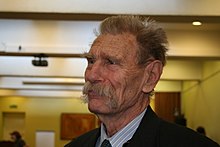Heino Kiik
Heino Kiik (born May 14, 1927 in the village of Jaaguvälja, today Änniksaare village , Avinurme rural community , Ida-Viru district , Estonia ; † February 22, 2013 ) was an Estonian writer .
Early years
Heino Kiik was born the son of a farmer. He attended school in Vadi from 1935 to 1941 and then until 1944 the grammar school in Mustvee . With the Soviet occupation of Estonia in 1945 his father Jaan (1899–1947) were arrested and in 1949 his mother Ella-Johanna (* 1899) and his brother Kalju (* 1935) and other family members were deported to Siberia . The father and other members of the family were killed in Siberia.
From 1945 to 1947 Kiik trained at the horticultural institute in Räpina . From 1947 to 1956, Kiik studied agricultural science at the Estonian Agricultural Academy (now the Estonian University of Environmental Sciences ) in Tartu . From 1948 he worked in various socialist companies as an agronomist and gardener.
Heino Kiik began a journalistic and writing career in the 1950s. From 1952 to 1954 he worked as an assistant at the agricultural newspaper Talurahvaleht , 1950/51 in the editorial department of the communist newspaper Rahva Hääl (“People's Voice”) and from 1955 to 1958 for the newspaper Edasi (“Forward”). From 1952 to 1962 he was the responsible editor of the magazine Sotsialistlik Põllumajandus ("Socialist Agriculture"). He published numerous books and essays on horticulture and botany.
From 1969 to 1971 and 1974/75 Kiik took writing courses at the renowned Maxim Gorky Literature Institute in Moscow .
writer
From 1963 Kiik worked as a freelance writer. Heino Kiik became known to a larger audience primarily with his prose literature . In 1969 he joined the Estonian SSR Writers' Union . From 1976 to 1981 and from 1986 to 1989 he was a member of the Board of Directors of the Writers' Union. From 1981 to 1986 he was secretary of the association.
His novels are committed to realism . He also wrote travel literature and popular science works. His memoirs, which he published in diary form from 1976 on, also attracted attention. Kiik called them "documentary novels".
Numerous works by Kiik criticized the conditions in the Soviet Union, in particular the collectivization of agriculture and the Soviet deportations , even if occasionally only between the lines and behind the scenes. Many of his books such as Mind armastas jaapanlanna and Maria Siberimaal were written as early as the 1970s, but could only be freely published after the political upheaval in Estonia because of Soviet censorship. In 1980 Kiik was one of the signatories of the so-called " Letter of Forty ". The open letter sharply denounced the Russification policy of the Soviet authorities in the Estonian SSR .
Politician
After Estonian independence was regained, Heino Kiik was also involved in party politics. From 1994 to 2000 he was a member of the Eesti Sinine Erakond , from 2000 to 2002 of the successor party Eesti Demokraatlik and from 2002 of the conservative Isamaa ja Res Publica Liit .
Works (selection)
- Metsiku taltsutamine. Puhume juttu põllust ja muustki. (Youth book, 1965)
- Mõedaku eelpäev (story, 1966)
- Taimetark (agricultural non-fiction book, 3 volumes, 1968–1986)
- Tondiöömaja (novel, 1967)
- Arve Jomm (novel, 7 volumes, 1971–1990)
- Tütarlaps ja teised (play, 1974)
- Maailma viljad (agricultural non-fiction book, 4 volumes, 1982–1986)
- Elupadrik (novel, 1986)
- Rõõm päikesest (Journalism, 1986)
- Mind armastas jaapanlanna (erotic novel; Volume I 1987, Volume II 1990; second edition 1992)
- Maria Siberimaal (novel, 1988)
Private life
Heino Kiik was married to the ballet dancer Helmi Puur (* 1933) in 1968.
literature
- Cornelius Hasselblatt : History of Estonian Literature. Berlin, New York 2006, ISBN 3-11-018025-1 , pp. 610-612.
- Eesti elulood. Tallinn: Eesti entsüklopeediakirjastus 2000 (= Eesti Entsüklopeedia 14) ISBN 9985-70-064-3 , p. 157.
Web links
- Works by Heino Kiik in the holdings of the Estonian National Library , Tallinn
- Biobibliographical information
- CV (Estonian)
- Life and work (French)
- Obituary ( Postimees online, February 22, 2013)
Individual evidence
- ↑ http://www.eesti.ca/suri-kirjanik-heino-kiik/article38765
- ↑ http://www.epl.ee/news/eesti/suri-eesti-kirjanike-liidu-liige-heino-kiik.d?id=65723110
- ↑ Rein Veidemann: Arvustus: Heino ja Helmi eluromaan , August 6, 2014 in kultuur.postimees.ee
| personal data | |
|---|---|
| SURNAME | Kiik, Heino |
| BRIEF DESCRIPTION | Estonian writer |
| DATE OF BIRTH | May 14, 1927 |
| PLACE OF BIRTH | Jaaguvälja village, today Änniksaare , Avirnurme rural community , Ida-Viru county , Estonia |
| DATE OF DEATH | February 22, 2013 |
